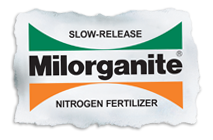Pre-germinating Seed

Germinating turf seed is one of the slower parts of the seeding process. Bentgrass and bluegrass are notorious for being slow to germinate. Anything that can be done to speed this process leads to a quicker result…green turf.
In this process, Milorganite bulks and dries the seed. This helps make the seed easier to spread uniformly and accurately. Milorganite, having virtually no salt, will not cause seed damage.
- Place the grass seed in a porous material. Use a cheesecloth or burlap sack. Tie at the top to form a bag.
- Place this sack with seed in a covered container. A fish tank works well for this.
- Soak the seed in water for 3 to 5 days. Bluegrass should be soaked for 5 days.
- Make sure all seed is wetted.
- Place container in a dark area.
- Maintain temperature at 65 to 72 degrees F.
- Change water every 12 hours.
- After 3 to 5 days, remove seed from container.
- Drain excess water from seed and bag.
- Prepare seeding area.
- Mix seed with Milorganite.
- Lightly incorporate seed into soil by lightly raking or, if on sandy soils, watering.
- Irrigate lightly and frequently. Keep seed moist.
- Follow specific seed starting instructions for the seed variety that you are using.
Learn More About Pre-Germinating Grass Seed
| Seed Type | Milorganite lbs/ seed mix | Seed lbs | Seed rate per 1,000 sq ft | Coverage area of Mix |
|---|---|---|---|---|
| Bentgrass | 20 | 5 | 1 lb | 5,000 sq ft |
| Bermudagrass | 20 | 5 | 1 lb | 5,000 sq ft |
| Blue Grass | 100 | 25 | 4 lbs | 6,250 sq ft |
| Blue-Rye Mix | 100 | 25 | 6 lbs | 4,250 sq ft |
| Rye Grass | 100 | 25 | 8 lbs | 3,250 sq ft |

